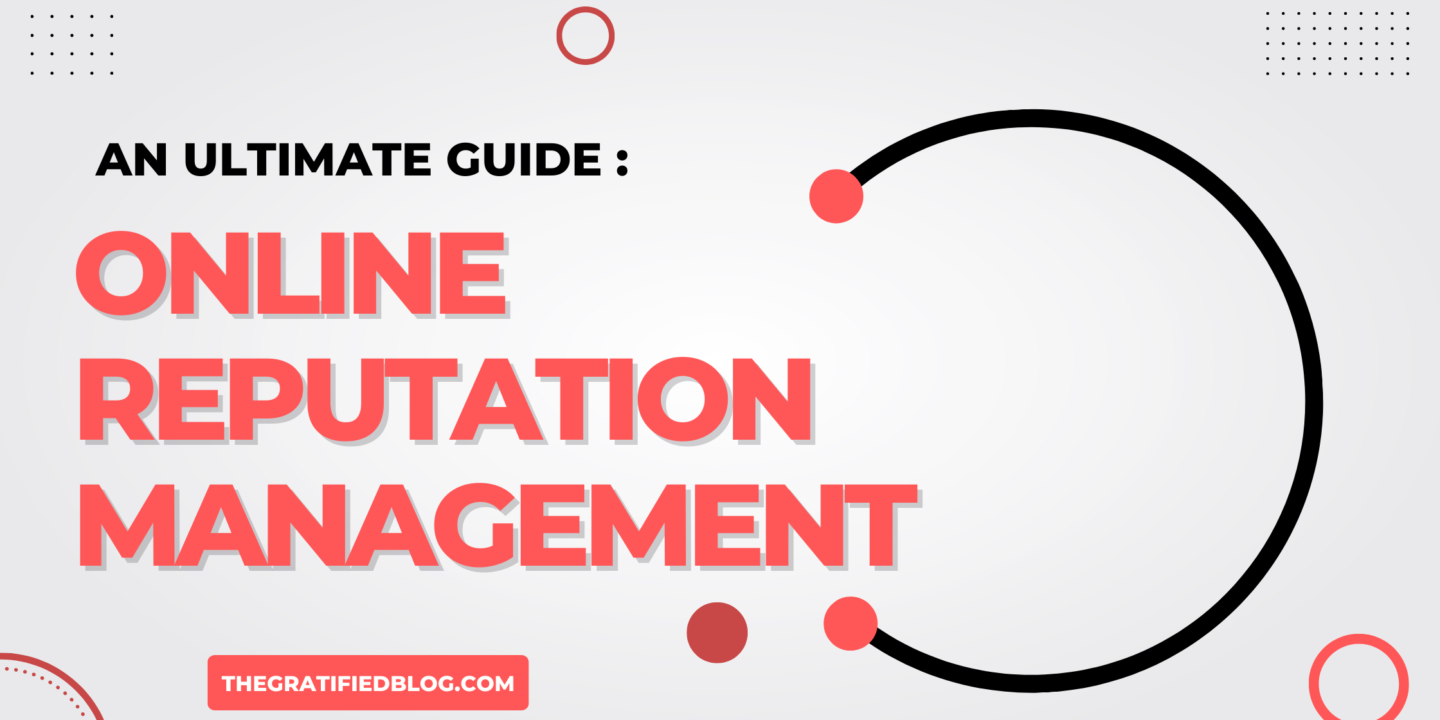
In the realm of business, the phrase “You can’t judge a book by its cover” extends to online reputation management. Understanding “Why Is Online Reputation Management Important” is crucial in today’s landscape. Your digital image matters, especially with online reviews being a primary factor for potential customers. An excellent online reputation is essential for attracting and retaining customers in an era where first impressions are often based on what’s found online.
So, This article will discuss online reputation management and its importance to businesses. We’ll also talk about some tools and strategies you can use to improve your online reputation. And in the end, we’ll share some final thoughts on the importance of online reputation management and how you can stay ahead in today’s online world.
So, let’s begin;
What Is Online Reputation Management?
As we know, In today’s online world, online reputation plays a vital role in any business. So, in simple terms,
Online reputation management is the process of monitoring, managing, and improving your online presence to ensure that you have a positive online reputation in any industry.
Why Is Online Reputation Management Important For Any Business?
There are many reasons why online reputation management is essential for businesses. Some of the key benefits include:
Boosting Online Visibility And Traffic
Effective online reputation management enhances your brand’s visibility, drawing more traffic to your website or online store. A positive digital image attracts potential customers and encourages them to explore your offerings, boosting your online presence.
Reducing Online Risks And Preventing Online Reputation Crises
Proactive reputation management helps identify and address potential issues before they escalate. By monitoring online sentiments, businesses can mitigate risks, prevent reputation crises, and safeguard their brand from negative publicity.
Improving Search Rankings
A positive online reputation contributes to improved search engine rankings. Search engines prioritize reputable and trustworthy content, so actively managing your digital image can increase visibility, making it easier for customers to find your business online.
Attracting New Customers And Clients Through Online Reviews And Testimonials
Reviews and testimonials online play a crucial role in drawing in new customers. A well-maintained online reputation, highlighted by positive reviews, serves as social proof, instilling confidence in potential clients and increasing the likelihood of them choosing your products or services.
Boosting Customer Trust And Engagement Online
A positive online reputation fosters trust among your audience. Customers who see a business with a robust digital presence and positive interactions are likelier to engage with the brand. This engagement, in turn, strengthens customer relationships and loyalty, contributing to long-term success.
Now that you understand the importance of online reputation management essential, Let’s now dive into the seven ways to perform online reputation of the brand
7 Ways To Perform Online Reputation For Brands
We all know that as the digital Industry is growing faster, online reputation plays a vital role in any business. However, Here are some strategies that you can use to improve your online reputation and build trust with your customers:
Conduct A Brand Audit
A brand audit is crucial in managing your online reputation effectively. It thoroughly assesses your brand’s online presence, perception, and performance.
Here’s a more detailed explanation of the brand audit process:
- Define your goals: Start by clearly defining the objectives and goals of your brand audit. Determine what you want to achieve and the specific aspects of your online reputation that you want to evaluate. This could include analyzing customer sentiment, identifying potential reputation risks, or understanding the impact of your current online efforts.
- Identify your target audience: Understand your target audience and what they expect from your brand online. This includes analyzing their online behavior, preferences, and the platforms they frequent. Use tools like social listening to gather insights about their conversations, sentiments, and interactions related to your brand or industry.
- Assess your online presence: Review your online presence across various channels, including your website, social media profiles, review sites, forums, and other platforms relevant to your industry. Evaluate the consistency and accuracy of your brand messaging, visual identity, and overall user experience. Identify any gaps or inconsistencies that may need to be addressed.
- Monitor online reviews and feedback: Pay close attention to online reviews and feedback about your brand. Analyze both positive and negative reviews to understand the sentiment, common themes, and areas for improvement. This will help you identify potential issues or areas where you can leverage positive feedback to enhance your reputation.
- Evaluate competitor presence: Assess the online presence and reputation of your competitors. Compare their strategies, strengths, weaknesses, and customer perception with your own. This analysis can help you identify areas where you can differentiate yourself and gain a competitive advantage.
Address Negative Reviews
Addressing negative reviews is a crucial aspect of online reputation management. When encountering a negative review, handling it professionally and promptly to mitigate any potential damage and demonstrate your commitment to customer satisfaction is essential.
To effectively address negative reviews, responding directly to the customer on the review platform or privately contacting them via email or phone is essential. Begin by acknowledging their feedback and expressing empathy toward their experience. Take responsibility for any inconvenience caused and assure them their concerns are being taken seriously.
Avoid becoming defensive or engaging in arguments. Instead, focus on seeking a resolution or offering to rectify the situation. Request specific details about their experience to better understand the issue and demonstrate your commitment to addressing it. Respond sincerely and thoughtfully, outlining the steps you will take to resolve the problem and improve the customer experience moving forward.
After addressing the negative review publicly, it is crucial to follow through with any commitments made to the customer.
Monitor Brand Mentions
Monitoring brand mentions is a crucial aspect of online reputation management. By actively monitoring online content for mentions of your brand name, you can stay informed about what is being said about your business and take appropriate actions to protect and enhance your reputation.
You can use online tools and services to track and analyze online content to monitor brand mentions. One popular tool is Google Alerts, which allows you to set up alerts for specific keywords or phrases, including your brand name. Whenever new content that includes your specified keywords is published online, you will receive email notifications, enabling you to stay updated in real-time.
By staying vigilant and proactive in monitoring brand mentions, you can effectively manage your online reputation, maintain a positive image, and promptly respond to both positive and negative feedback, ensuring your brand is well-regarded by your target audience.
Invest In SEO, SMM, And Other Activities
To ensure that your online reputation continues to grow over time, you must invest in activities that will help improve your online visibility and reach. This includes
- Search engine optimization (SEO),
- Social media marketing (SMM), and
- Other online marketing strategies.
While these may seem daunting at first, many tools available today make them more accessible than ever before. So don’t be afraid to invest in online marketing activities to stay ahead of your competition and grow your online reputation.
Leverage Public Relations
Leveraging public relations is an essential strategy in online reputation management. By partnering with online influencers, industry experts, or reputable websites, you can increase your brand’s online visibility and reach a wider audience. Collaborating with influencers allows you to tap into their established audience base and benefit from their credibility and trustworthiness.
You can showcase your brand’s expertise, values, and unique offerings through strategic public relations efforts, such as guest blogging, sponsored content, or product reviews. This helps to establish your brand as an authority in your industry and builds trust with potential customers.
By leveraging public relations, you can effectively amplify your brand’s reach, improve online visibility, and ultimately enhance your online reputation by building trust and credibility with your target audience.
Create Positive Content
Creating and sharing high-quality, relevant content is fundamental to online reputation management and digital marketing. By consistently producing valuable content that aligns with the interests and needs of your target audience, you can establish yourself or your brand as a reliable source of information and expertise. here are some ways you can create positive content:
- Blogging is a popular form of content creation that allows you to share in-depth insights, industry updates, how-to guides, and thought leadership pieces. By regularly publishing blog posts, you not only provide valuable information to your audience but also improve your website’s search engine visibility, driving organic traffic and attracting potential customers.
- In addition to blogging, social media updates are an effective way to engage with your audience and showcase your brand’s personality. Social media platforms allow you to share bite-sized content, updates, announcements, and visual content such as images and videos. This helps to maintain an active online presence, foster two-way communication with your audience, and amplify your brand’s reach as followers like, share, and comment on your content.
- Visual content formats, such as infographics and videos, can also be powerful tools to convey complex information in an easily digestible and visually appealing manner. Infographics present data or concepts using visually appealing graphics, while videos allow you to tell stories, demonstrate products or services, or share tutorials. These types of content enhance engagement, grab attention, and have the potential to go viral, increasing your brand’s visibility and reach.
Encourage Customers To Engage.
Encouraging your current customers to engage online is a valuable strategy for strengthening your online reputation and building trust with your audience. When customers actively participate in online discussions, leave positive reviews, and share their experiences, it showcases their satisfaction with your brand and acts as social proof for potential customers.
One effective way to encourage customer engagement is by offering incentives or rewards. This could include loyalty programs, exclusive discounts, or special promotions for customers who leave reviews, share your content on social media, or engage in online discussions about your brand. You motivate customers to act and advocate for your business by providing tangible benefits.
Another approach is simply asking customers to share their experiences and feedback online. This can be done through personalized follow-up emails, social media posts, or in-store signage. By explicitly inviting customers to share their thoughts, you demonstrate that their opinions matter and that you value their feedback. Make it easy for them to engage by providing direct links to review platforms or creating branded hashtags for social media conversations.
By actively encouraging customer engagement online, you foster a positive online reputation, increase customer satisfaction, and strengthen your relationship with your audience.
Tools To Monitor Online Reputation
Online reputation monitoring can be a tedious and time-consuming task when done manually. However, to simplify and expedite the process, various online tools are available that make online reputation management more accessible and efficient.
Some of the most popular online tools for online reputation monitoring include
Well, Google has several tools for digital needs, and online reputation monitoring is one of their best. You need to enter your brand name as if you enter different searches you want to get an alert for.
Then Google will notify you whenever your brand or business is mentioned online.
Social Mention is another monitoring tool that allows you to track online mentions of your brand, competitors, or industry keywords on every social media site, such as Facebook, LinkedIn, Twitter, etc.
This tool is free to use and provides various other features, such as:
- Strength: This describes the probability of how well the brand will be discussed on social media.
- Sentiment: It’s the ratio of positive feedback to negative feedback.
- Passion: It’s the value of online conversations related to a specific brand.
- Reach refers to unique authors and influencers who write about your brand.
SEMrush
SEMrush is an online marketing research tool that can help you take your online reputation to the next level. It allows you to track specific features such as:
- Referral Traffic from mentions
- Mentions without backlinks
- Mentoring authority of the resource.
Final Thoughts
Now that you comprehend why is online reputation management important make it crucial key part of your overall online marketing strategy. And also, Ensure to monitor it consistently.
If you have questions about online reputation strategies, please comment in the comment section. We will be happy to answer you.
Thanks for reading 🙂








No Comments